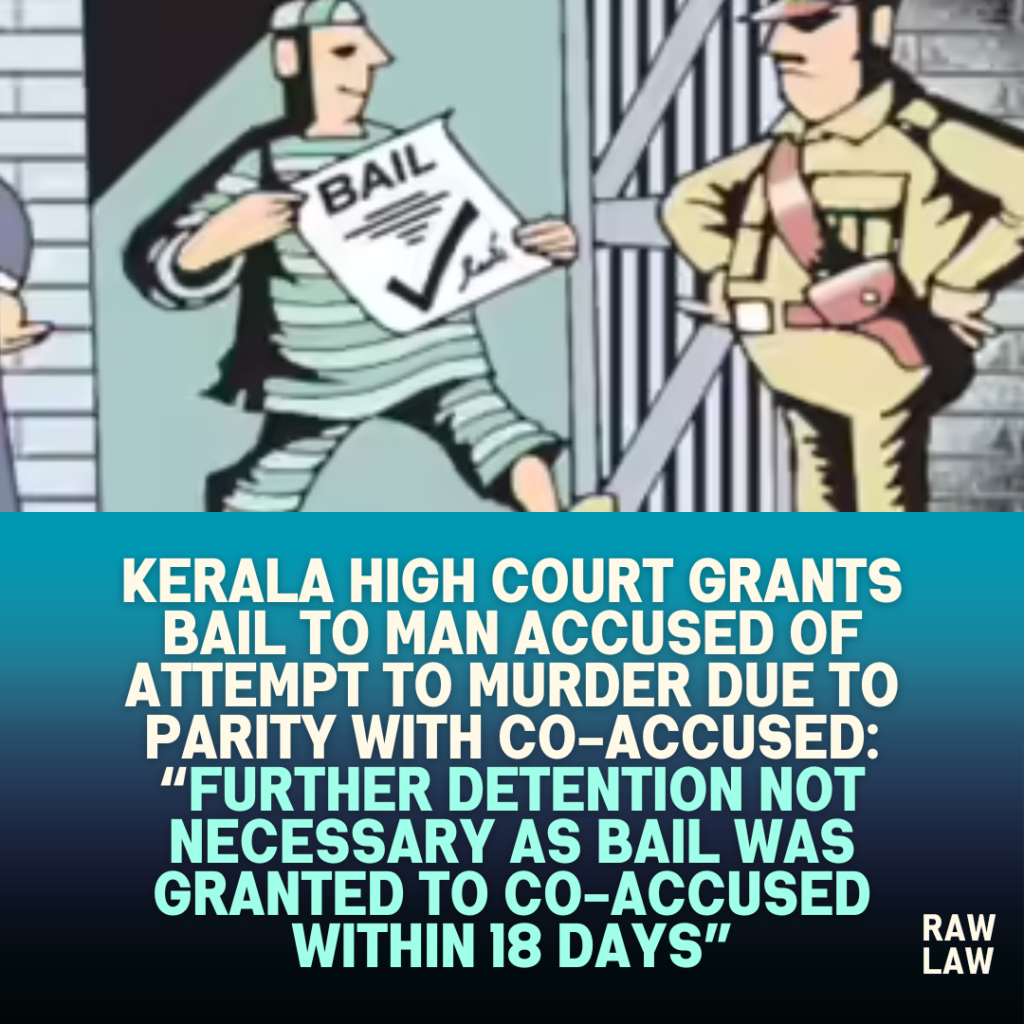Court’s Decision
The Kerala High Court granted bail to the petitioner, the third accused in a case involving alleged attempt to murder, on the ground of parity. The Court noted that co-accused 1 and 2 were granted bail within 18 days of arrest, and hence, the further detention of the petitioner was unwarranted. The Court observed:
“Since accused 1 and 2 were granted bail within 18 days of their arrest, I am of the view that further detention of the petitioner is not necessary.”
The petitioner was directed to be released on bail upon execution of a bond for ₹50,000 with two solvent sureties and was subjected to standard bail conditions including cooperation with investigation, non-tampering with evidence, and prohibition on leaving India without permission.
Facts
The petitioner, the third accused in Crime No.2048 of 2024 of Tirur Police Station, was arrested on 4 June 2025 in connection with offences under Sections 189(2), 191(2), 191(3), 126(2), 118(1), 109, and 190 of the Bharatiya Nyaya Sanhita, 2023. The prosecution alleged that on 16 December 2024, at around 8 p.m., the petitioner along with others assaulted the de facto complainant using dangerous weapons due to previous enmity, causing serious injuries.
Issues
- Whether the petitioner, accused of serious offences including attempt to murder, was entitled to bail on the ground of parity with co-accused who were granted bail earlier.
Petitioner’s Arguments
The petitioner contended that the allegations were false and that he had been in custody since 4 June 2025. It was argued that in view of the regular bail granted to co-accused 1 and 2, the petitioner also deserved to be released. The bail orders of co-accused were placed on record as Annexure A3 and A4.
Respondent’s Arguments
The Public Prosecutor opposed the bail application, arguing that the petitioner was involved in a serious assault with intent to commit murder and releasing him at this stage could affect the investigation and the safety of the complainant and witnesses.
Analysis of the Law
The Court considered the applicability of the principle of parity in bail jurisprudence, wherein similarly placed co-accused are treated alike unless there are distinguishing factors. The Court emphasized that the petitioner had been in custody for over 20 days, and his case was not materially different from co-accused who were granted bail.
Precedent Analysis
The Court referred to its own prior orders granting bail to co-accused 1 and 2 in B.A. No. 2412 of 2025 and B.A. No. 1316 of 2025. These orders were relied upon to establish parity. Although the order does not cite Supreme Court precedents, the principle of parity is well-settled in criminal bail jurisprudence.
Court’s Reasoning
The Court noted the time elapsed since the petitioner’s arrest and the absence of any exceptional circumstance to treat him differently from the co-accused. It stated that since bail was granted to co-accused within 18 days of arrest, “further detention of the petitioner is not necessary.”
Standard conditions were imposed, including cooperation with investigation, prohibition from tampering with evidence, and restriction on international travel.
Conclusion
The High Court allowed the bail application of the petitioner, setting the following conditions:
- Execution of a bond for ₹50,000 with two solvent sureties.
- Cooperation with the investigation.
- No intimidation or influence on witnesses.
- No commission of similar offences.
- No travel outside India without court permission.
It also granted liberty to the jurisdictional Court to modify the conditions if needed.
Implications
- Parity in bail is reaffirmed: Courts must consider consistency in bail decisions for similarly placed accused.
- Judicial balancing of liberty and crime seriousness: Even in serious offences, if co-accused are out on bail and no further custodial interrogation is necessary, bail may be granted.
- Evolving interpretation under Bharatiya Nyaya Sanhita, 2023: This decision applies the newly enacted criminal statute while affirming settled principles from pre-BNSS jurisprudence.
Referred Cases and Their Relevance
- B.A. No. 2412 of 2025 & B.A. No. 1316 of 2025: These were earlier bail orders of the Kerala High Court concerning co-accused in the same crime. The Court placed reliance on these to extend the benefit of bail to the petitioner by invoking the principle of parity.
FAQs
1. Can an accused get bail solely because co-accused were granted bail earlier?
Yes, if the role of the accused is not significantly different and there are no aggravating circumstances, bail may be granted on the ground of parity.
2. What does the principle of parity mean in bail cases?
Parity means equal treatment. If co-accused with similar allegations have been granted bail, others should also be considered for bail unless there are distinguishing factors.
3. Can the conditions imposed by the High Court be modified by lower courts?
Yes, the High Court specifically stated that the jurisdictional Court can consider any application for modification or deletion of bail conditions.



